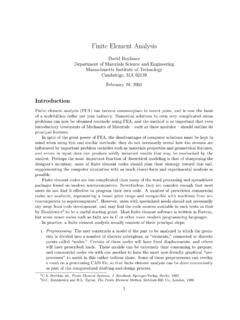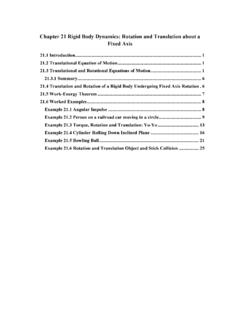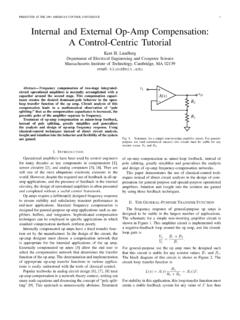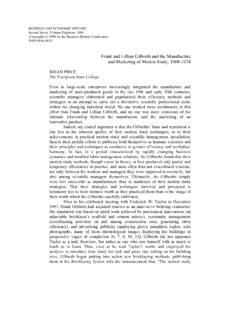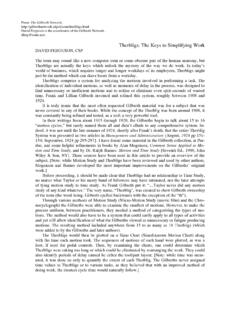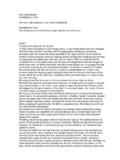Transcription of The Aleph - MIT
1 The Aleph by Jorge Luis Borges O God! I could be bounded in a nutshell, and count myself a King of infinite Hamlet, II, 2 But they will teach us that Eternity is the Standing still of the Present Time, a Nunc-stans (as the schools call it); which neither they, nor any else understand, no more than they would a Hic-stans for an Infinite greatness of Place. Leviathan, IV, 46 On the burning February morning Beatriz Viterbo died, after braving an agony that never for a single moment gave way to self-pity or fear, I noticed that the sidewalk billboards around Constitution Plaza were advertising some new brand or other of American cigarettes. The fact pained me, for I realised that the wide and ceaseless universe was already slipping away from her and that this slight change was the first of an endless series.
2 The universe may change but not me, I thought with a certain sad vanity. I knew that at times my fruitless devotion had annoyed her; now that she was dead, I could devote myself to her memory, without hope but also without humiliation. I recalled that the thirtieth of April was her birthday; on that day to visit her house on Garay Street and pay my respects to her father and to Carlos Argentino Daneri, her first cousin, would be an irreproachable and perhaps unavoidable act of politeness. Once again I would wait in the twilight of the small, cluttered drawing room, once again I would study the details of her many photographs: Beatriz Viterbo in profile and in full colour; Beatriz wearing a mask, during the Carnival of 1921; Beatriz at her First Communion; Beatriz on the day of her wedding to Roberto Alessandri; Beatriz soon after her divorce, at a luncheon at the Turf Club; Beatriz at a seaside resort in Quilmes with Delia San Marco Porcel and Carlos Argentino; Beatriz with the Pekingese lapdog given her by Villegas Haedo.
3 Beatriz, front and three-quarter views, smiling, hand on her I would not be forced, as in the past, to justify my presence with modest offerings of books books whose pages I finally learned to cut beforehand, so as not to find out, months later, that they lay around unopened. Beatriz Viterbo died in 1929. From that time on, I never let a thirtieth of April go by without a visit to her house. I used to make my appearance at seven-fifteen sharp and stay on for some twenty-five minutes. Each year, I arrived a little later and stay a little longer. In 1933, a torrential downpour coming to my aid, they were obliged to ask me for dinner. Naturally, I took advantage of that lucky precedent. In 1934, I arrived, just after eight, with one of those large Santa Fe sugared cakes, and quite matter-of-factly I stayed to dinner.
4 It was in this way, on these melancholy and vainly erotic anniversaries, that I came into the gradual confidences of Carlos Argentino Daneri. Beatriz had been tall, frail, slightly stooped; in her walk there was (if the oxymoron may be allowed) a kind of uncertain grace, a hint of expectancy. Carlos Argentino was pink-faced, overweight, gray-haired, fine-featured. He held a minor position in an unreadable library out on the edge of the Southside of Buenos Aires. He was authoritarian but also unimpressive. Until only recently, he took advantage of his nights and holidays to stay at home. At a remove of two generations, the Italian S and demonstrative Italian gestures still survived in him. His mental activity was continuous, deeply felt, far-ranging, and all in all meaningless. He dealt in pointless analogies and in trivial scruples.
5 He had (as did Beatriz) large, beautiful, finely shaped hands. For several months he seemed to be obsessed with Paul Fort less with his ballads than with the idea of a towering reputation. He is the Prince of poets, Daneri would repeat fatuously. You will belittle him in vain but no, not even the most venomous of your shafts will graze him. On the thirtieth of April, 1941, along with the sugared cake I allowed myself to add a bottle of Argentine cognac. Carlos Argentino tasted it, pronounced it interesting, and, after a few drinks, launched into a glorification of modern man. I view him, he said with a certain unaccountable excitement, in his inner sanctum, as though in his castle tower, supplied with telephones, telegraphs, phonographs, wireless sets, motion-picture screens, slide projectors, glossaries, timetables, handbooks, He remarked that for a man so equipped, actual travel was superfluous.
6 Our twentieth century had inverted the story of Mohammed and the mountain; nowadays, the mountain came to the modern Mohammed. So foolish did his ideas seem to me, so pompous and so drawn out his exposition, that I linked them at once to literature and asked him why he didn t write them down. As might be foreseen, he answered that he had already done so that these ideas, and others no less striking, had found their place in the Proem, or Augural Canto, or, more simply, the Prologue Canto of the poem on which he hd been working for many years now, alone, without publicity, with fanfare, supported only by those twin staffs universally known as work and solitude. First, he said, he opened the floodgates of his fancy; then, taking up hand tools, he resorted to the file. The poem was entitled The Earth; it consisted of a description of the planet, and, of course, lacked no amount of picturesque digressions and bold apostrophes.
7 I asked him to read me a passage, if only a short one. He opened a drawer of his writing table, drew out a thick stack of papers sheets of a large pad imprinted with the letterhead of the Juan Cris stomo Lafinur Library and, with ringing satisfaction, declaimed: Mine eyes, as did the Greek s, have known men s towns and fame, The works, the days in light that fades to amber; I do not change a fact or falsify a name The voyage I set down autour de ma chambre. From any angle, a greatly interesting stanza, he said, giving his verdict. The opening line wins the applause of the professor, the academician, and the Hellenist to say nothing of the would-be scholar, a considerable sector of the public. The second flows from Homer to Hesiod (generous homage, at the very outset, to the father of didactic poetry), not without rejuvenating a process whose roots go back to Scripture enumeration, congeries, conglomeration.
8 The third baroque? decadent? example of the cult of pure form? consists of two equal hemistichs. The fourth, frankly bilingual, assures me the unstinted backing of all minds sensitive to the pleasures of sheer fun. I should, in all fairness, speak of the novel rhyme in lines two and four, and of the erudition that allows me without a hint of pedantry! to cram into four lines three learned allusions covering thirty centuries packed with literature first to the Odyssey, second to Works and Days, and third to the immortal bagatelle bequathed us by the frolicking pen of the Savoyard, Xavier de Maistre. Once more I ve come to realise that modern art demands the balm of laughter, the scherzo. Decidedly, Goldoni holds the stage! He read me many other stanzas, each of which also won his own approval and elicited his lengthy explications.
9 There was nothing remarkable about them. I did not even find them any worse than the first one. Application, resignation, and chance had gone into the writing; I saw, however, that Daneri s real work lay not in the poetry but in his invention of reasons why the poetry should be admired. Of course, this second phase of his effort modified the writing in his eyes, though not in the eyes of others. Daneri s style of delivery was extravagant, but the deadly drone of his metric regularity tended to tone down and to dull that extravagance. [Among my memories are also some lines of a satire in which he lashed out unsparingly at bad poets. After accusing them of dressing their poems in the warlike armour of erudition, and of flapping in vain their unavailing wings, he concluded with this verse: But they forget, alas, one foremost fact BEAUTY!]
10 Only the fear of creating an army of implacable and powerful enemies dissuaded him (he told me) from fearlessly publishing this poem.] Only once in my life have I had occasion to look into the fifteen thousand alexandrines of the Polyolbion, that topographical epic in which Michael Drayton recorded the flora, fauna, hydrography, orography, military and monastic history of England. I am sure, however, that this limited but bulky production is less boring than Carlos Argentino s similar vast undertaking. Daneri had in mind to set to verse the entire face of the planet, and, by 1941, had already dispatched a number of acres of the State of Queensland, nearly a mile of the course run by the River Ob, a gasworks to the north of Veracruz, the leading shops in the Buenos Aires parish of Concepci n, the villa of Mariana Cambaceres de Alvear in the Belgrano section of the Argentine capital, and a Turkish baths establishment not far from the well-known Brighton Aquarium.


